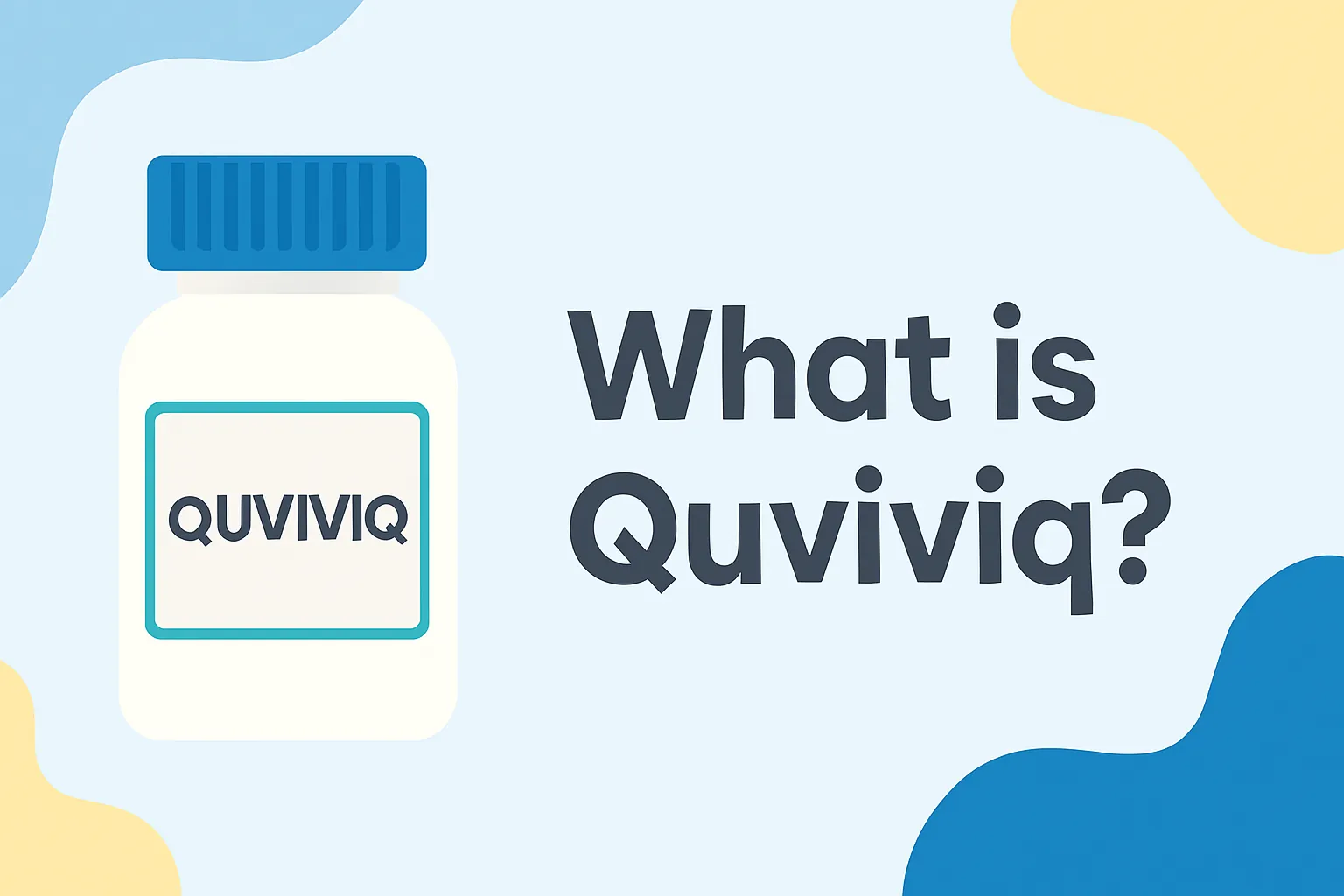What is Quviviq?

If you’re one of the 30% of American adults experiencing insomnia, your doctor may prescribe Quviviq (daridorexant). Approved by the FDA in 2022, Quviviq is a prescription medication taken at bedtime to help you fall asleep and stay asleep. It works by blocking orexin, a neurotransmitter involved in keeping you awake.
Quviviq is a Schedule IV controlled substance due to its potential for misuse or abuse. However, clinical studies found that taking Quviviq nightly did not lead to withdrawal symptoms after stopping.
It is taken as an oral, film-coated tablet once nightly, typically within 30 minutes of going to bed. You should only take Quviviq if you plan to sleep for at least 7 hours to avoid next-day drowsiness and impaired alertness.
How does Quviviq work?
The active ingredient in Quviviq is daridorexant, a dual orexin receptor antagonist (DORA) classified as a hypnotic. It blocks the action of orexin by binding to its two main receptors. Orexin helps regulate wakefulness, so by inhibiting it, Quviviq helps you fall asleep faster, stay asleep longer, and function better during the day.
What is Quviviq used to treat?
Quviviq is FDA-approved to treat adults with insomnia, including:
- Sleep onset insomnia – difficulty falling asleep
- Sleep maintenance insomnia – waking up during the night and struggling to return to sleep
Your healthcare provider may prescribe Quviviq if you have one or both of these types of sleep problems.
What are the possible side effects of Quviviq?
Common side effects include:
- Headache
- Sleepiness or fatigue
- Dizziness
- Nausea
Serious but rare side effects may include:
- Severe allergic reactions (e.g., hives, facial swelling, difficulty breathing)
- Complex sleep behaviors (e.g., sleepwalking, sleep-driving, sleep-eating)
- Daytime sleepiness that may affect driving or alertness
- Worsening depression or suicidal thoughts
- Sleep paralysis, hallucinations, or cataplexy-like symptoms
- Breathing difficulties, especially in patients with COPD or sleep apnea
Contact your healthcare provider if you experience any side effects. Report adverse effects to the FDA at 1‑800‑FDA‑1088 or www.fda.gov/medwatch.
Are there any drug interactions with Quviviq?
Quviviq can interact with various drugs and substances. Inform your healthcare provider if you take:
- Other sleep medications (e.g., Ambien)
- HIV medications (e.g., indinavir)
- Benzodiazepines (e.g., diazepam, lorazepam)
- Opioids (e.g., hydrocodone, oxycodone)
- Antifungals (e.g., ketoconazole, itraconazole)
- Antibiotics (e.g., clarithromycin, ciprofloxacin)
- Seizure medications (e.g., carbamazepine, phenytoin)
- Muscle relaxants (e.g., baclofen, cyclobenzaprine)
- Antidepressants (e.g., amitriptyline, trazodone)
- Herbal supplements (e.g., melatonin, valerian, St. John’s Wort)
- Alcohol
What should you tell your healthcare provider before starting Quviviq?
Be sure to tell your doctor if you have or have had:
- Depression, mental illness, or suicidal thoughts
- Substance abuse or addiction
- Cataplexy or narcolepsy
- Breathing problems (e.g., sleep apnea, COPD)
- Liver disease
- Pregnancy or plans to become pregnant
- Breastfeeding or plans to breastfeed
If you take Quviviq while pregnant, consider joining the pregnancy registry by calling 1‑833‑400‑9611 to help collect safety data.
How should you take Quviviq?
Take Quviviq exactly as prescribed, typically within 30 minutes of bedtime. Only take it if you plan to sleep for at least 7 hours. Avoid taking it with or right after a meal, as this may delay its effect. Contact your healthcare provider if your insomnia doesn’t improve within 7 to 10 days.
If you think you’ve taken too much, contact your doctor or seek emergency care immediately.
How should you store Quviviq?
Store at room temperature between 68°F to 77°F (20°C to 25°C). It can be temporarily stored between 59°F to 86°F (15°C to 30°C) if needed. Keep out of reach of children.
Is Quviviq safe for older adults?
Yes, but older adults may be more sensitive to side effects like daytime sleepiness and fatigue, which can increase the risk of falls or affect driving. Extra monitoring may be necessary for those 65 and older.
Is Quviviq a benzodiazepine?
No. Quviviq is not a benzodiazepine. Benzodiazepines work by enhancing GABA activity in the brain, while Quviviq blocks orexin signals. It is a dual orexin receptor antagonist (DORA) used specifically for insomnia.
Related Medications
Sources
- Quviviq – daridorexant tablet, film coated [package insert]. Idorsia Pharmaceuticals Ltd. (2023). Accessed July 1, 2024.
- Kunz, D., et al. (2022). Long-term safety and tolerability of daridorexant. CNS Drugs. Accessed July 1, 2024.
- Mignot, E., et al. (2022). Safety and efficacy of daridorexant. The Lancet. Accessed July 1, 2024.
- Muehlan, C., et al. (2023). Orexin receptor antagonists and insomnia. Journal of Sleep Research. Accessed July 1, 2024.
- Quviviq (daridorexant). Medscape. Accessed July 1, 2024.





